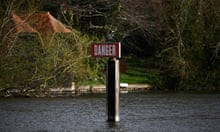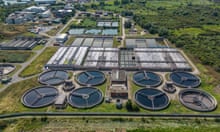Investors in Thames Water have pulled the plug on £500m of emergency funding amid a standoff with the industry regulator over attempts to raise bills, increasing the prospect that the heavily indebted company may be nationalised.
The beleaguered utilities company said on Thursday that its shareholders had refused to provide the first tranche of £750m funding to secure its short-term cashflow, after the company had failed to meet certain conditions.
Britain’s biggest water company has been lobbying the regulator, Ofwat, to increase bills by 40%, pay lower fines for breaches and keep paying out dividends. The watchdog has been examining the company’s business plan for 2025 to 2030, and Thames said Ofwat’s initial assessments of the plan make the company “uninvestible” for shareholders.
Michael Gove, the communities secretary, said Thames should not pass on higher bills to consumers. He added: “The leadership of Thames Water has been a disgrace. I think for years now we have seen customers of Thames Water taken advantage of by successive management teams that have been taking out profits and not investing as they should have been.”
The GMB union, which represents many of Thames Water’s workers, accused the company’s shareholders of “essentially blackmailing” customers and Ofwat.
The funding failure heightens the possibility that Thames Water could be placed into special administration, which would result in the government stepping in and temporarily renationalising the company.
Chris Weston, the chief executive of Thames Water, said on Thursday that this was a “long way off” but did not rule out the possibility.
Weston said the company had £2.4bn of funds it could draw on, which would last until next May or June. “There is a chance that somewhere down the stream you might get to a specific special administration outcome but there’s a lot of water to go under the bridge.”
He said there were various methods of raising funds “so there’s a huge amount that has to happen before you can even begin to conclude that [administration] is the case”.
Ofwat is due to give its first public view on Thames and its peers’ business plans in June, at which point Thames is expected to attempt to secure extra equity from new and existing shareholders. Weston added that the company would continue to serve its 15 million customers as usual.
The crisis for Thames Water comes after devastating data on the scale of raw sewage discharges into rivers and seas this week.
Thames Water oversaw a 163% increase in the duration of sewage dumping into rivers as its creaking infrastructure failed to cope with rainfall levels.
Thames is also at the centre of a major investigation by the water regulator for England and Wales, Ofwat, into sewage dumping from its treatment works, which could lead to large financial penalties being imposed on the company.
In July, Thames Water had agreed £750m of funding, with the first payment expected to be made on 31 March, contingent on conditions.
Weston said Ofwat was examining Thames’s five-year plan “line by line” to decide how efficient the plan was and the extent to which the company could increase bills to cover the cost of repairs, investment and running costs.
after newsletter promotion
However, investors believe Ofwat has so far been too stringent, and refused to provide the £500m of new equity.
A statement on behalf of Thames’s shareholders said: “After more than a year of negotiations with the regulator, Ofwat has not been prepared to provide the necessary regulatory support for a business plan which ultimately addresses the issues that Thames Water faces. As a result, shareholders are not in a position to provide further funding to Thames Water. Shareholders will work constructively with Thames Water, Ofwat and government on how to address the consequences of Ofwat’s decision.”
An Ofwat spokesperson said: “Safeguards are in place to ensure that services to customers are protected regardless of issues faced by shareholders of Thames Water. Today’s update from Thames Water means the company must now pursue all options to seek further equity for the business to turn around the performance of the company for customers.”
Gary Carter, GMB national officer, said: “Assets and infrastructure are falling apart – instead of putting the money in to fix it, shareholders are refusing to pay a penny unless bills are allowed to rocket. Holding bill payers to ransom for costs after years of underinvestment is completely unacceptable.”
Separately on Thursday, Thames Water’s parent company, Kemble Water Finance, said it would be unable to repay a £190m debt that is due at the end of April. It has appointed advisers from the turnaround consultant Alvarez & Marsal to handle negotiations with lenders and the holders of its debt. Weston said Thames’s customers would not be affected if Kemble defaulted.
When asked about the prospect of Thames Water going into special administration, a government spokesperson said that there were a range of options available to the company to secure new investment.
Thames’s financial woes are likely to draw further attention on the stewardship of the company by Macquarie, the Australian bank that previously owned the water supplier and which has been heavily criticised for building huge debts at Thames to pay dividends to shareholders.
Its current backers include the large Canadian pensions firm Omers; the UK university staff pension scheme; China’s sovereign wealth fund and a subsidiary of the Abu Dhabi sovereign wealth fund.










